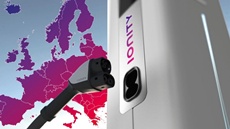Life after oil: Shell partners top carmakers for electric charging stations
27 Nov 2017
Royal Dutch Shell has partnered with top carmakers to deploy ultra-fast chargers on Europe's highways, stealing a march on rivals in the race to remove one of the biggest obstacles facing the electric car sector as it prepares for life beyond oil.
 Shell, the world's second biggest oil company, has signed an agreement with IONITY - a joint venture between BMW, Daimler, Ford and Volkswagen - that will initially bring high-powered docks to 80 highway sites in 10 European nations in 2019, it said in a statement.
Shell, the world's second biggest oil company, has signed an agreement with IONITY - a joint venture between BMW, Daimler, Ford and Volkswagen - that will initially bring high-powered docks to 80 highway sites in 10 European nations in 2019, it said in a statement.
Power giants including France's Engie and Germany's E.ON, as well as niche players such as US start-up ChargePoint, are all building vehicle-charging networks in Europe, but Shell says the IONITY technology is a key to addressing the problem of journey distances.
While electric vehicles still account for only a small fraction of the global car market, the pace of growth and a sustained period of low crude prices are prompting oil companies to reassess century-old business models as the world move towards cleaner modes of transportation and experts agree the days of fossil fuels are numbered.
The agreement builds on Shell's acquisition of Europe's largest electric-vehicle charging provider NewMotion last month. The deals come as markets including France, the UK and China are talking about phasing out the sale of fossil-fuel-powered cars in the coming decades, and major energy companies are looking to adapt.
India too has vowed to have only electric cars on its roads by 2030, but experts don't seem to be taking this very seriously as in the absence of any concrete policy decision to further the aim, and with a perennial shortage of power, the proposition looks doubtful.
Shell and IONITY will initially have charging points at 80 of Shell's biggest highway fuel stations, with an average of six posts in each. It will take five to eight minutes on average to charge an electric vehicle at these points, according to the statement.
Shell opened its first rapid-charging point for electric cars at gasoline stations in the UK last month. The company wants 20 per cent of profit margins from fuel sold in its retail forecourts to come from vehicles that don't burn diesel or gasoline by 2025, John Abbott, the top executive of its downstream business, said in September.
Under Shell's most aggressive projections the company expects the global electric vehicle fleet to grow from about 1 per cent of the entire auto fleet today to 10 per cent by 2025, displacing oil demand equating to about 800,000 barrels per day.
Rival BP said in August that it was talking to electric car manufacturers on deals to offer battery recharging docks at its stations.
The number of electric vehicle charging points in Europe nearly tripled from 2014 to 2017 to reach almost 120,000, according to the European Alternative Fuels Observatory.
However, manufacturers have struggled to offer solutions for getting drivers to go beyond short journeys, mostly within cities, because of battery limitations, a lack of charging stations and long charging times.
With the IONITY technology, cars with advanced charging capacity of up to 350 kilowatts will take as little as five to eight minutes to charge, Shell said. It can take several hours to charge a regular electric car today.
''Customers want to go on long journeys in their electric vehicles and feel confident that there are reliable, comfortable and convenient places to charge them quickly,'' said Shell's head of retail Istvan Kapitany.
The 80 charging stations will be deployed in Belgium, Britain, France, the Netherlands, Austria, the Czech Republic, Hungary, Poland, Slovakia and Slovenia.
With an additional 20 stations expected to be added in Germany, about a quarter of Shell's stations along highways in Europe will offer high-power electric charging within two years, Kapitany told Reuters.
Shell will invest in changing power supplies to its stations to meet growing demand, he said, declining to disclose the size of the investment or terms of the IONITY deal.
The IONITY partners joined forces with a plan to build a pan-European network of 400 charging stations by 2020.
The initiative is latest in a number of small Shell investments in charging technology in recent months, including the acquisition of Dutch-based NewMotion, owner of one of Europe's largest charging networks.


















